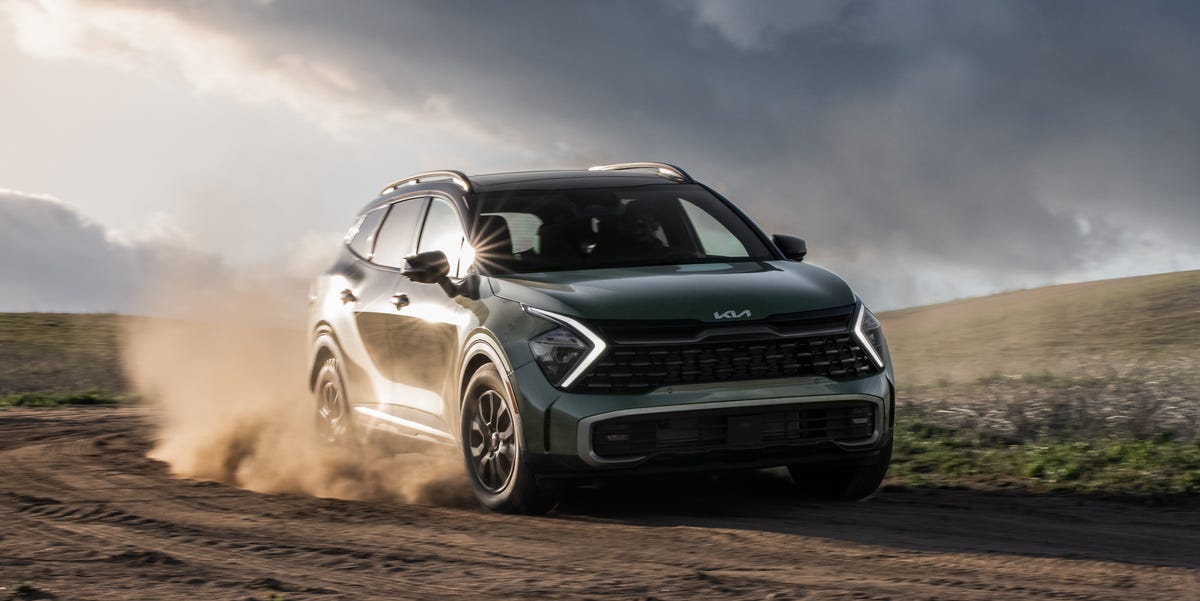2023 Kia Sportage Leads with Bold Styling

Given the smashing success that is the Kia Telluride, it might have been smart for Kia’s designers to simply scale down that three-row SUV’s squared-off looks when it came time to redesign the brand’s smaller crossovers. But the latest generation of the mid-size Sorento doesn’t stick to that template, nor does the new 2023 Sportage, which brings a distinctive look to the compact segment.
Whether or not you’ll be a fan of the Sportage’s design is another story. We won’t call it ugly, but its face is somewhat polarizing. With boomerang-shaped accent lights, low-mounted headlights, and a wide-mouth grille, the front end makes a strong statement. What exactly that statement is, we’ll leave up to you. The rear end is a bit more cohesive, with smooth surfaces and taillights that remind us of the handsome units on the Kia EV6. The Sportage surely won’t be mistaken for its corporate sibling, the Hyundai Tucson, which also looks striking for a mainstream crossover.
The Sportage is not all about form, though. Significantly larger than its predecessor in length, wheelbase, and many other dimensions, the new model is on the big end of the compact-SUV spectrum. It doesn’t offer a third row of seats like the Volkswagen Tiguan and the Mitsubishi Outlander, but a 3.4-inch increase in wheelbase greatly expands its rear-seat and cargo space. We like how the rear seats slide and recline, and the Sportage’s 40 cubic feet of cargo volume behind the second row just edges out what the Honda CR-V offers.
This Kia’s interior trappings also are nicer than that Honda’s. Upper-trim Sportage models have two integrated 12.3-inch display screens in front of the driver, one for the digital gauge cluster and the other for infotainment. Both screens have bright, crisp graphics, and the dashboard’s various materials are pleasant to the touch where it counts (and still nicely grained hard plastic where it doesn’t). Another screen down on the center stack is flanked by two physical knobs that can display either haptic climate-control buttons or a row of navigation and audio controls. The functions of those two knobs can also change depending on inputs, which is a neat feature but not necessarily a convenient one when you reach down to adjust the volume and realize the knob is currently set for temperature control.
More knobs and buttons reside on the center console to manage everything from the optional heated and ventilated seats—an EX model we drove had glaringly blank buttons for the ventilated seats it wasn’t equipped with—to the various drive modes and off-road settings, such as hill-descent control and the ability to lock in the all-wheel-drive system. Like basically every other crossover maker these days, Kia is touting its vehicle’s capability in the dirt, and it’s now offering the Sportage in X-Pro trim with all-terrain tires and some rugged-looking visual tweaks. While the X-Pro performed well on a fairly aggressive (Kia-prepped) off-road course, all Sportage models equipped with all-wheel drive have a decent 8.3 inches of ground clearance.
On pavement, the Sportage exhibits a nicely sorted ride-and-handling balance, but, unsurprisingly for an everyday SUV, isn’t what we’d call engaging to drive. Much of the blame goes to steering that’s bereft of feedback, a brake pedal without much initial bite, and throttle response that is somewhat sluggish. There may not be much here for enthusiasts, but the Sportage is a perfectly pleasant vehicle to pilot day to day, even if it doesn’t turn in as sharply as, say, a Mazda CX-5. Sadly, Kia has abandoned the outgoing Sportage’s zippy optional turbo 2.0-liter engine in the new model. Instead, it’s focusing on hybrid variants to pad out the model range. The base naturally aspirated 2.5-liter inline-four, which pairs with an eight-speed automatic transmission, produces an unremarkable 187 horsepower and feels rather pokey on the road. It also can sound buzzy when you push it above 4000 rpm or so.
We think the better option is the quieter and more refined hybrid setup, with a turbocharged 1.6-liter four, two electric motors, a 1.5-kWh battery, and a six-speed dual-clutch automatic. This combination is both more powerful (a combined 227 horsepower) and responsive than the base engine. We’re willing to forgive the hybrid’s occasionally lumpy power delivery because of the fuel-economy boost it provides: Its EPA combined estimate of 43 mpg with front-wheel drive and 38 mpg with all-wheel drive is a huge jump over the nonhybrid’s 25 to 28 mpg combined. However, we will point out that the mechanically similar Tucson hybrid returned disappointing real-world fuel economy, so we’ll need to see whether that’s the case with the Sportage once we get one to test. A 261-hp plug-in hybrid is also coming later this year; we have yet to drive that model.
Kia doesn’t price its vehicles as aggressively as it used to, but the starting points for the new Sportage—$27,245 for the base LX model up to $38,045 for a X-Pro Prestige—fall into a competitive range for compact crossovers. We’d be reluctant to pay close to $40,000 for a version with the base engine; the X-Pro, for example, can’t be had with the hybrid powertrain. But a nicely equipped EX hybrid in the mid-$30K range strikes us as an attractive proposition, distinctive styling and all.
A car-lover’s community for ultimate access & unrivaled experiences. JOIN NOW
This content is created and maintained by a third party, and imported onto this page to help users provide their email addresses. You may be able to find more information about this and similar content at piano.io



